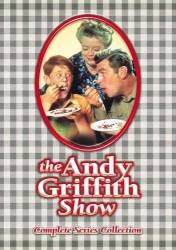
Continuity mistake: When Opie surprises Andy by telling him that he wants to take piano lessons with Clara, he heads to the piano to play what he already knows, and when Opie plays Chopsticks on the piano he's wearing a different shirt.


Continuity mistake: When Opie surprises Andy by telling him that he wants to take piano lessons with Clara, he heads to the piano to play what he already knows, and when Opie plays Chopsticks on the piano he's wearing a different shirt.

The Taylors in Hollywood - S6-E8
Revealing mistake: While Andy, Aunt Bee, and Opie are at the Hollywood studio watching a scene being filmed, when Andy mistakenly stands up and interrupts the filming we can see the wall and shelves behind the director, and it should look familiar because it's the wall and shelves from Floyd's shop in Mayberry.

Visible crew/equipment: When Otis tries to escape from Aunt Bee's clutches by hiding in the laundry service van, just as Aunt Bee has the driver open the van's back doors we can see the reflection of the moving boom mic in the left window.
Trivia: In Walker's Drugstore, among all the magazines by the wall there's a TV Guide magazine (from Oct 9, 1954) on the shelf, and on its cover is Lucille Ball the co-owner of Desilu Productions - which produced TAGS, and also filmed at Desilu Studios.
My Fair Ernest T. Bass - S4-E17
Trivia: At different points during this episode both Barney and Andy make the exact same comment, "If you wrote this into a play nobody'd believe it." This episode is based on My Fair Lady, which in turn is based on Pygmalion.
Trivia: Jack Dodson, who later played Howard Sprague, was originally cast to play Ed the Insurance man in an earlier episode called "Lost and Found".
Opie's Group - S8-E9
Andy: Clara, sometimes a parent can't see what he should do, and sometimes it takes a person from the outside to show him. And I'd like to thank you.
Clara: Groovy.
Question: Who was Ralph Henderson?
Question: Beginning with the "Convicts at Large" episode in season 3, full width window boxes appear at the bottom of both front windows on the inside of the Sheriff's Office. Prior to this episode, they did not exist. Window boxes are often used to display decorative plants but I don't see any plants. And if they were supposed to partially block the background, the blinds were long enough to accomplish that. I find it hard to believe that the producers would spend additional money (for material and labor) for something that seems to serve no purpose. So why were they added?
Answer: As noted in the previous answers, in real life, things like this provided wind and/or rain deflection, and also maintained a bit of privacy when blinds were raised somewhat. The interior courthouse set was located in the studio, so the "outside" Main Street didn't exist. I believe these things were added to the courthouse windows for practicality, to avoid some crew movement being visible on the opposite side of those windows. These are not "window boxes" to hold anything, as they're actually bottomless; we can see the Venetian blind's long pull cords under them. They're made of plywood and simple to build, so the "material and labor" was inexpensive. Similar variations made of different materials are in other movies/shows. In 1957's "12 Angry Men," textured chicken wire glass panels are in the jury room windows, and in "Jesse Stone: Night Passage" another type is in Jesse's office windows.
Answer: Those "boxes" are valences that used to be very common, before air conditioning. They allow for windows to be open during rain storms. They permit air circulation, without letting the rain in.
Answer: I suspect these were common, as to block the wind from blowing the blinds and papers on the desk.
Question: Why is it when they were on the show the Darling sons never spoke? Would they be paid more if they did, or was this some sort of joke?
Answer: It was a joke. They were supposed to be dumb hillbillies.
Both. According to later interviews with both Andy and the Dillards band (the real name of the band that played the parts of the Darling children, of which Charlene (Maggie Peterson - Mancuso was also a member) the reason the Darling boys never had any lines was because they would've had to have been paid if they spoke. In return for appearing without lines or pay, Andy promised to get as much of their music onto the show as possible which, he did. This obviously gave them a lot of exposure.
Separate from membership, this is to get updates about mistakes in recent releases. Addresses are not passed on to any third party, and are used solely for direct communication from this site. You can unsubscribe at any time.
Check out the mistake & trivia books, on Kindle and in paperback.
Answer: In S3 x E11 Convicts-at-Large, there is a character named Big Maude Tyler, who is the leader of three female escaped convicts. Andy listens to the radio as the news announcer says that Big Maude's aliases include Clarice or Annabelle Tyler and also one amusingly named Ralph Henderson.
Super Grover ★